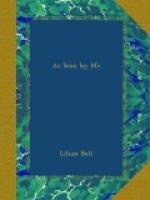Everywhere you go you hear the insistent, importunate cry for backsheesh. Old men, women, children, dragomans, guides, merchants, and street-venders—all sorts and conditions of men beg for it. They teach even babies to take hold of your dress and cry for it. And to toss backsheesh over to the crowd on the bank as the steamer moves away is to see every one of them roll over in the dirt and fight and scratch like cats over half a piaster. There is no such thing as self-respect among the natives. They are governed by blows and curses, and even the eyes of sheiks and native police glisten at the word “backsheesh.”
At Assiout one night we heard some one calling from the bank in English: “Lady, lady, give me some English books. I am a Christian. I can read English. Give me a Bible. I go to the American college. I want to be a preacher.” I leaned over the railing and discerned a very black boy, whose name, he said, was Solomon. I was so surprised to hear “Bible” instead of “backsheesh” that I investigated. He said his mother and father were dead; that he had only been to college a year; that he wanted to be a preacher, and that he would pray God for me if I would give him a Bible. I was touched. He spelled America, and I gave him backsheesh. He told me the population of the United States, and I gave him more backsheesh. He sang “Upidee” with an accent which threw me into such ecstasies that it brought the whole boat to hear him, and we all gave him backsheesh. But his piety was what captivated us. I heard afterwards that no fewer than ten of us privately resolved to give him Bibles. He begged us to visit the college; so the next day eight of us gave up the tombs and went to the American college, which was floating the Stars and Stripes because it was Washington’s birthday. We spoke to Dr. Alexander, the president, of our friend Solomon. He told us that he was an absolute fraud, but one of the cleverest boys in the college. He was not an orphan. His father took a new wife every year, and his mother also had an assorted collection of husbands. He had been to school five years instead of one. He had no end of Bibles. People gave them to him and he sold them. He had been in jail for stealing, and on the whole his showing was not such as to encourage us to help him to preach. Such was Solomon, a typical Egyptian, an equally accurate type of the Arab. They are the cleverest and most consummate liars in the world. I wonder that the noble men and women who are giving their lives to teaching in that wonderful mission college have the courage to go on with it, the material is so unpromising. Yet Arabic acuteness makes it interesting, after all. A pretty little water-carrier named Fatima, who wore a blue bead in the hole bored in her nose, and only one other garment besides, ran beside me at Denderah, calling me “beautiful princess,” and kissing my hand until she made my glove sticky. None of us were too old or too hideous in our Nile costumes to be called beautiful and good. My donkey-boy at Karnak assured me that I was his father and his mother. He touched his forehead to my hand, then showed me how his dress was “broken,” and begged his new father-and-mother to give him a new one.




